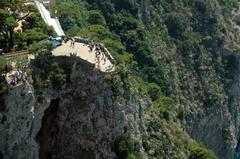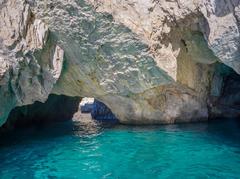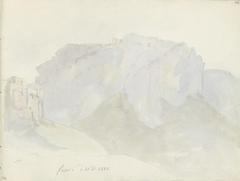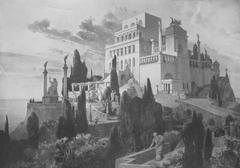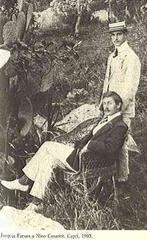
Casa Malaparte Capri Italy: Visiting Hours, Tickets, and Comprehensive Guide
Date: 03/07/2025
Introduction
Dramatically perched atop the cliffs of Punta Massullo on Capri’s eastern coast, Casa Malaparte is both an architectural masterpiece and a symbol of artistic individuality. Renowned for its stark red façade, geometric forms, and panoramic rooftop, this villa—conceived by Italian writer Curzio Malaparte—reflects a fusion of modernism and Mediterranean spirit. While Casa Malaparte is a private residence and not generally open to the public, its cultural significance, cinematic legacy, and striking presence make it a must-see for visitors to Capri. This guide provides detailed historical background, architectural insights, cultural impact, and practical travel information to help you experience this iconic site to the fullest.
For more information, see Casa Malaparte on Wikipedia and Italy Segreta’s detailed account.
Table of Contents
- Historical Background
- Visiting Casa Malaparte: Practical Information
- Visuals and Media
- FAQs
- Conclusion
- References and Further Reading
Historical Background
Origins and Commissioning
Casa Malaparte’s story begins in the late 1930s, during a time of significant artistic experimentation in Italy. Curzio Malaparte (Kurt Erich Suckert), a noted Italian writer and journalist, envisioned a home that would be a “self-portrait”—deeply personal and expressive of his complex character. Initially, he collaborated with modernist architect Adalberto Libera, but Malaparte soon assumed creative control, working closely with local stonemason Adolfo Amitrano. The villa was constructed between 1937 and 1942 on a remote outcrop overlooking the Gulf of Salerno, chosen for its solitude and dramatic setting (Wikipedia; Italy Segreta).
Architectural Design and Symbolism
Casa Malaparte is celebrated as a triumph of Italian modernist architecture. The villa’s bold red masonry, minimalist rectangular form, and meticulously positioned windows set it apart from Capri’s traditional whitewashed homes (ArchDaily). Its most iconic feature is the monumental, reverse-pyramidal staircase ascending to a flat rooftop terrace. Here, a curving white wall frames panoramic sea views while serving as a windbreak, seamlessly integrating architecture and landscape (WikiArquitectura).
Inside, the villa’s spaces are austere yet poetic, with original furnishings such as a sunken marble bath and a book-lined study. The use of local stone ensures harmony with the surrounding cliffs, while the orientation and large windows maximize natural light and breathtaking vistas (ArchEyes).
Cultural and Artistic Significance
From its inception, Casa Malaparte was not only a private residence but a cultural symbol. Malaparte saw himself as “designing the landscape,” and the villa quickly achieved iconic status among artists and architects (Italy Segreta). Its most famous appearance came in Jean-Luc Godard’s 1963 film Le Mépris (Contempt), where the villa’s rooftop and dramatic setting became cinematic motifs, cementing its mythic status (Wikipedia). The house has also inspired fashion brands and photographers, including Karl Lagerfeld, who described it as “a vision of a man with no visible influences” (Italy Segreta).
Post-Malaparte Era and Restoration
After Malaparte’s death in 1957, the villa fell into neglect. It was later donated to the Giorgio Ronchi Foundation, and restoration efforts in the late 1980s and 1990s—spearheaded by Malaparte’s great-nephew Niccolò Rositani—returned it to habitable condition (Wikipedia). Many original furnishings remain due to their size and integration with the structure. Today, Casa Malaparte hosts scholarly study and cultural events but remains a private residence.
Legacy in Modern Architecture
Casa Malaparte is recognized as one of the finest examples of twentieth-century Italian modernism, blending rationalist geometry with an organic relationship to the landscape (MWKLY). Its influence is evident in architectural scholarship, exhibitions, and popular culture, reinforcing Capri’s reputation as an epicenter of artistic innovation.
Visiting Casa Malaparte: Practical Information
Accessibility, Visiting Hours, and Tickets
Casa Malaparte is a private residence and is not open to the public for general visits.
- Visiting Hours: None (private property; no public access inside the villa)
- Tickets: Not available for public tours. Entry may be possible during rare cultural events or by special invitation, but these occasions are infrequent and not announced widely.
Viewing the villa:
- From Land: The best views are from the Pizzolungo hiking trail, a moderately challenging path beginning near Capri town’s Piazzetta. The trail takes 45–60 minutes each way and offers several vantage points for photography.
- From Sea: Boat tours departing from Marina Grande (and other Capri harbors) pass beneath Casa Malaparte, providing unique perspectives of its cliffside setting (Capri.com).
Accessibility notes:
- The hiking trail is not suitable for visitors with limited mobility.
- There are no public facilities, such as restrooms or cafes, near the villa.
- The terrain is uneven—sturdy footwear and water are recommended.
How to Get There
- By Foot: Take the Pizzolungo trail from the center of Capri or from Marina Piccola. Be prepared for uneven paths and elevation changes.
- By Boat: Join a guided boat tour or private charter for the best sea views.
Guided Tours and Nearby Attractions
While interior access is not available, some local operators offer guided hikes or boat trips that include informative commentary on Casa Malaparte and Capri’s history.
Nearby attractions include:
- Arco Naturale: A dramatic limestone arch along the Pizzolungo trail.
- Faraglioni Rocks: Iconic sea stacks visible from the villa.
- Gardens of Augustus: Panoramic gardens with views of the Faraglioni.
- Blue Grotto: Capri’s renowned sea cave.
- Capri Town: The Piazzetta, luxury shops, and charming cafes.
Visuals and Media
Enhance your exploration of Casa Malaparte with:
- Images and Alt Text:
- Casa Malaparte viewed from the sea – dramatic cliffside villa with red exterior
Alt text: Casa Malaparte cliffside view in Capri with Mediterranean backdrop. - The monumental staircase leading to the rooftop terrace
Alt text: Casa Malaparte’s iconic 32-step staircase painted Pompeian red.
- Casa Malaparte viewed from the sea – dramatic cliffside villa with red exterior
- Maps and Virtual Tours:
- Maps of Capri highlighting the Pizzolungo trail and boat routes.
- Virtual tours and high-resolution photo galleries available through select cultural platforms.
Frequently Asked Questions (FAQ)
Q: Can I visit the inside of Casa Malaparte?
A: No, the villa is privately owned and not open to the public. Visitors can only admire it from nearby trails or by boat.
Q: What are the best ways to see Casa Malaparte?
A: By hiking the Pizzolungo trail or taking a boat tour that circles Capri, both of which offer excellent photographic opportunities.
Q: Are there guided tours?
A: Some local operators offer guided hikes and boat tours focusing on the villa and Capri’s history.
Q: Is there an entrance fee?
A: No, as there are no public visits to the villa itself.
Q: Is Casa Malaparte wheelchair accessible?
A: No, the surrounding terrain and trails are not suitable for wheelchairs.
Q: When is the best time to view Casa Malaparte?
A: Spring and early autumn are ideal for pleasant weather and fewer crowds; early morning or late afternoon provides the best light for photography.
Conclusion
Casa Malaparte endures as one of Capri’s most captivating landmarks—a testament to artistic vision and modernist innovation. While entry is restricted, the villa’s dramatic location and design inspire visitors who make the journey along Capri’s hiking trails or by boat. Respect the privacy of this unique residence and enjoy its mystique from afar, while exploring the many other cultural and natural wonders Capri has to offer. For updates on rare special events or exhibitions, follow the Ronchi Foundation and Capri tourism channels.
For more travel tips and architectural insights, download the Audiala app, follow us on social media, and explore our other guides for curated cultural experiences.
References and Further Reading
- Casa Malaparte on Wikipedia
- Casa Malaparte: A House Like Me (Italy Segreta)
- Architecture Classics: Villa Malaparte (ArchDaily)
- Villa Malaparte Legend and Cinema (Capri.com)
- Casa Malaparte in Capri (WikiArquitectura)
- Casa Malaparte: Architecture in the Service of the Imagination (Archis)
- Discover a Stunning Example of Italian Modern Architecture (MWKLY)
- Jacquemus, Casa Malaparte, Capri – Storia (NSS Magazine)
- Casa Malaparte Is a Strangely Awesome House (JSTOR Daily)
- Guide of Capri – Villa Malaparte
- ArchEyes – Casa Malaparte in Capri
- Archweb – Villa Malaparte in Capri
- Villa Malaparte – Villa Quattro Colonne








